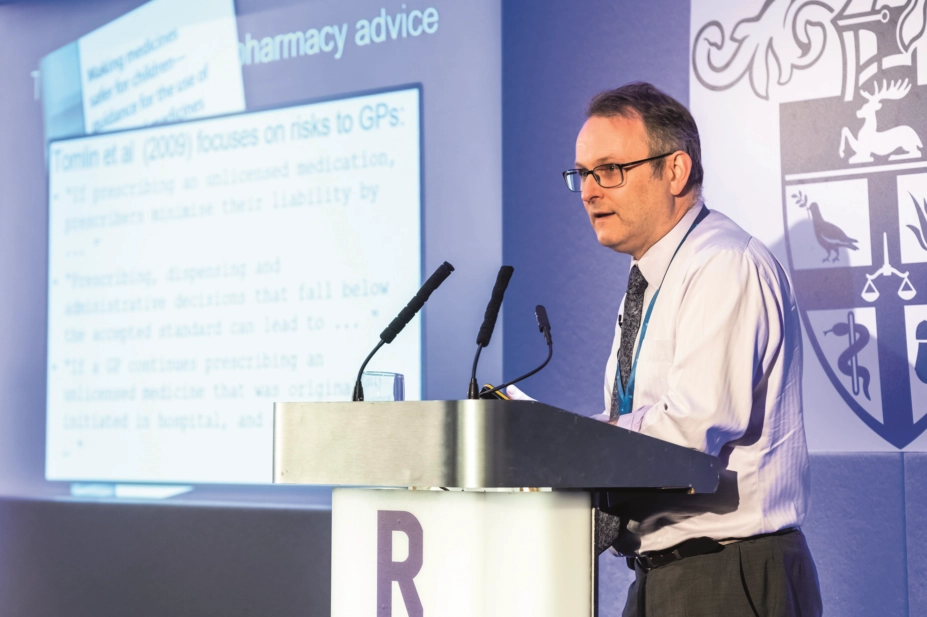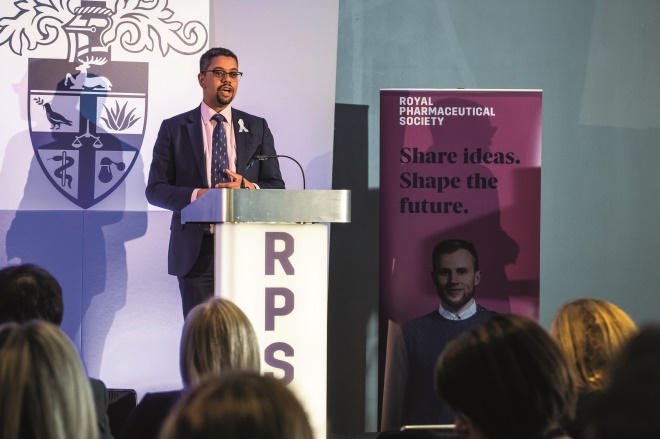
Nick Treharne
“To avoid unnecessary suffering in children, doctors must have support from expert pharmacist colleagues,” Richard Hain, consultant and lead clinician in paediatric palliative medicine in Wales told the eighth Royal Pharmaceutical Society (RPS) Welsh Medicines Safety Conference, held in Cardiff on 22 November 2018.
Hain was speaking from his experience of paediatric palliative care, and emphasised that while Wales has a highly developed clinical network for paediatric palliative care — “the best in the UK, and one of the best in the world” — expert pharmacy support was crucial to its effective functioning. Hain told delegates that a high proportion of medicines used in paediatric palliative care were unlicensed or off-label and that could, he said, leave some doctors feeling hesitant over when such medicines can be appropriately used.
Lack of confidence and experience of paediatric palliative medicine, alongside “inappropriate precautionary advice”, are major factors in this, he said, but added that “we can’t tolerate over-caution”. Licensed medicines should be used where they are effective, but unlicensed medicines may well be needed, and what really makes the difference, he said, was that if a doctor felt uncertain about their use they should be able to discuss it with specialist colleagues.
A personal perspective of paediatric palliative care was provided by Donna Dunn whose daughter, Emily Clark, died from non-Hodgkin (Burkitt’s) lymphoma at the age of 18 years. Dunn told delegates that she was “initially daunted by the number of medicines Emily needed”. While her daughter did encounter some problems with medicines during her treatment — on one occasion an antifungal medicine was missing from her bag, and on another occasion her prescribed anti-sickness medicine was ineffective — Dunn said that on the teenage cancer ward, the same pharmacist was around “every day between 10:00 and 13:00, so we could ask any questions”. Dunn felt her daughter’s treatment “was so tailor-made; the drugs may have been off-the-shelf, but [the] way she was treated was second to none”.

Source: Nick Treharne
Vaughan Gething told conference delegates that he expected all Welsh community pharmacies to have access to the GP patient record by March 2019
In his speech, Vaughan Gething, Welsh cabinet minister for health and social care, took inspiration from Aneurin Bevin who oversaw the creation of the NHS while he was the UK’s minister for health between 1945 and 1951. Bevin, Gething said, argued that “health services must always be inadequate: we must always be looking to improve”. Referencing ‘A Healthier Wales: Our plan for health and social care’, the Welsh government’s long-term plan for health and social care published on 11 June 2018, Gething spoke of more pharmacists working in general practice “improving patient safety as well as reducing the burden on GPs”.
Among other recent developments in Wales, he said, was the fact that 40% of Welsh community pharmacies now have access to the GP patient record, and that by March 2019 he expected all pharmacies to have similar access. “The RPS been a longstanding champion of info sharing,” he said, adding that he “understands the frustration that this has not happened as quickly as many would like”.
Andrew Evans, chief pharmaceutical officer for Wales, spoke of ‘A future vision for pharmacy in Wales — a new paradigm’ set to launch in March 2019 in response to a recommendation made by the National Assembly for Wales’s Public Accounts Committee, in March 2018, to maximise the use of pharmacy as a resource. The Committee recommended that the plan build on ‘Your Care, Your Medicines: Pharmacy at the heart of patient care’, a report from RPS Wales published in 2014.
“Medicines are increasingly complex health care interventions. If pharmacists don’t take responsibility for the safety aspect, no one else will,” Evans said.
The new vision would, Evans added, help the sector to respond to some of the challenges in A Healthier Wales. He pointed out that life expectancy in the UK is slowing down faster than in equivalent countries, and health inequity between England and Wales has widened.
Evans warned against too sharp a focus on the future, though, saying that the “future is critically important, but the promise of better tomorrow doesn’t absolve us from doing something about today”.
The afternoon also saw the launch of RPS Wales’s new policy on palliative and end-of-life care. Introducing the policy, Idris Baker, national clinical lead for palliative and end-of-life care in Wales, emphasised the need for equity of access to good palliative care.
“I won’t be content in my national role until everyone gets the same quality of palliative and end of life care, wherever they live in Wales,” he said.
As the conference closed, the chair Catherine Duggan, chief executive of the International Pharmaceutical Federation, announced that the Pharmaceutical Press would donate a range of titles to a medical library at Velindre Cancer Centre in Cardiff, where Emily Clark was treated. Money to build the library is being raised by a charity Emily Clark had set up.
You may also be interested in
Long service of members

Membership fees 2022
